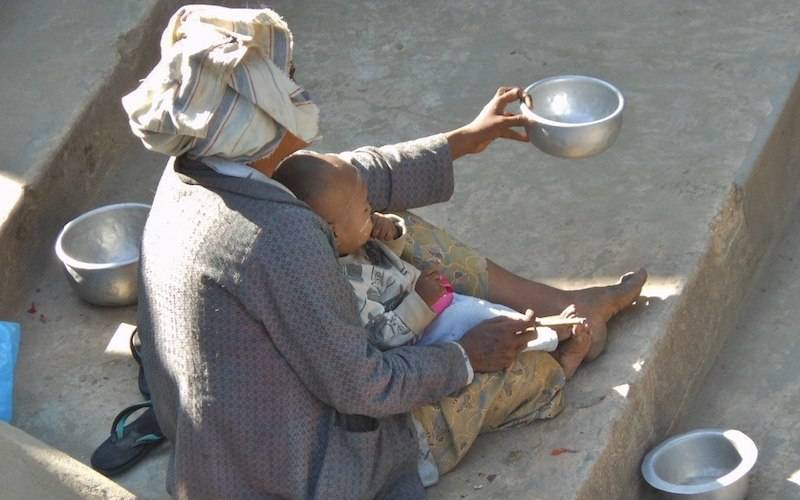Should you give money to beggars? It’s an important question that many people ask when travelling, especially in poverty stricken countries in Africa and Asia.
Most of us avoid giving money to beggars on the streets in our home countries and developed countries. That’s mainly because we know that there are welfare systems and charities set up to support people. We know that there are benefits and homeless shelters, as well as extensive support. Sometimes, we might offer a cup of tea or a sandwich – maybe even a tin of dog food for the dog! But on the whole, we don’t give money directly to people as it is better invested by governments and charities.
Should we give Money to Beggars in Developing Countries?
So what about the countries that don’t have welfare systems in place? What about countries that have recently come out of civil war and don’t have benefit systems in place for the sick and disabled? Is it ok to give cash to them? Should we give money to Beggars in developing countries? I am going to controversially explain why you should not give cash directly to beggars in developing countries.
Before I plunge into writing this article, I would like to say that this was not my view three or four years ago. With many years of travelling and volunteering experience, I have learnt a lot and developed as a person. Travel has changed the way that I think. I hope that this article will change the way that you think, too.
Book cheap hostels for your travels on hostelworld.com
5 Reasons why you should not give cash to people on the streets
Although you may feel like you are helping, there are many reasons why you should not give cash to people on the streets. Sometimes, it can risk your personal safety and also actually make the situation worse.
#1 It will Interrupt your Travel Itinerary and Risk your Safety
In at number one is a selfish reason not to give, I know. But some people give on the streets out of the goodness of their hearts and then cannot move!
When I was in Delhi (India), a friend of mine gave money to a street child, even though we had discussed the fact that it is best not to.
Literally 5 seconds later, we were surrounded! I don’t know where all of these street children came from, but it was evident that we were being watched. The thing was, it was the last day in India for us, and we had a tight schedule. Having to battle our way through swarms of street children was less than ideal when trying to get a taxi to the airport.
Do you think it’s harsh of me to put a selfish reason at #1? Well let me explain. Travellers are bringing money into a country and this is one of the best ways of support its economy and local businesses. If we return home with bad experiences that put other people off visiting that country, this is detrimental to its economy and future.
We have to be cruel to be kind. What I have learnt during my travels is that if you are not ok yourself, you can’t help anybody. That means that we have to focus on the bigger picture and avoid getting into difficult situations.
By giving money out on the street, you not only teach people to be dependent on handouts, but you also risk your own safety. It is much easier for you to get mugged or robbed in big crowds. Not all beggars are friendly and ligitimate. If you want to do good, put your own safety and sanity first.
#2 It teaches people to be Dependent on Handouts
During my time in Rwanda, I experienced poverty first hand. Rwanda is country that went through civil war and genocide in 1994, and sadly, poverty was the result. There was a whole generation of orphans in poverty as a result of war, genocide and HIV.
This was not an easy thing for me to come face to face with. I initially wanted to buy the children what they needed – clothes, food and medical care. But I came to realise two things. Firstly, I could not help everyone, so giving money or buying things would create an uneven distribution of wealth. Secondly, all I was teaching people to do if I gave money was to be dependent on a ‘Muzungu‘ (white person).
This was evident in how many people in Rwanda asked me to ‘buy them a laptop’ or ‘buy them a mobile phone’. If other volunteers and travellers have done this before, it becomes the norm. But it should not be.
If people in developing countries are encouraged to ‘beg’ for handouts, it is more difficult for them to learn how to stand on their own two feet. This means that giving money directly to beggars is not only teaching them to be dependent, but it can also be detrimental to their futures.
#3 It causes friction and Unfairness
If you are thinking of giving money to someone on the streets, think about this – can you do the same for everyone in their situation? The answer is probably no.
Giving money and possessions may seem helpful, but it can actually cause friction in communities. Why should one person be given something, but someone else in the exact same situation or position not be given that? Because they have met a European or American? Doesn’t seem fair, does it?
So the next time you think about buying a kid a pair of trainers, think about how he would be bullied by friends for having them, or how he could be held at knife point and get mugged for them. Then ask yourself ‘Should we give money to beggars?’
#4 It is not Sustainable
International development is a process that takes place over decades. There is no quick fix for poverty and short term poverty relief is rarely the answer. Short term aid is needed, of course, but this is usually in the case of disaster situations where emergency food and medical supplies are essential.
In long term poverty influenced by political, historical and social factors, sustainability is the key. That means that poverty relieving projects should work for the long term.
If you give money to someone on the streets, is that going to change things long term? No, it isn’t.
#5 It could do more Harm than Good
Although you may think that giving money or goods to people in developing countries is kind and helpful, you could actually be doing more harm than good.
In some situations, giving money to people in poverty-stricken countries could be going against the policies of government and NGO plans to relieve poverty.
I once said I would help someone in Rwanda to buy food, only to be told the next day by the charitable organisation that he was not the person in need of this the most. He had family who owned a farm in a neighbouring city. I did, of course, have to go and explain to him the next day why I had changed my mind – difficult, but something that had to be done. If I had checked first, I wouldn’t have put myself, or this Rwandan person, in this situation. You live and you learn.
In some situations, child beggars are ‘touted’ out to collect for for mafia gang leaders. Many children are sadly mamed for profit. If you haven’t seen the film ‘Slumdog Millionaire‘, you must watch it. This film will bring the realities of child begging in India to the forefront of your mind. If you give money to children in India, this is what you could be funding….
Sadly, organised begging and child making plagues large Indian cities such as Delhi and Bombay.
Do what is best for the country and the people, not what you think is best for them. It is easy to look at things from a Western perspective, and have a ‘my money will fix all’ approach. Sadly, the bigger picture is much more complex, and best left to the people who are trained to understand it.
Further Reading
Although I don’t believe in giving out money on the streets or directly to people, I do believe in helping to relieve poverty in sustainable ways. If you have enjoyed my discussion of the topic ‘should I give money to beggars’ then you might like to read some more of my articles on helping those in need and contributing to relieving poverty in developing countries.
If you found value in my article on giving money to beggars, you might also like to read Should I pay to Volunteer?

